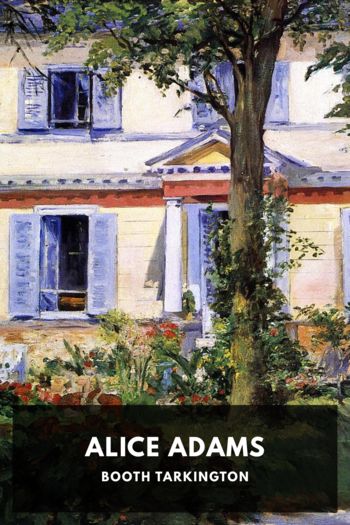National Avenue - Booth Tarkington (the little red hen ebook TXT) 📗

- Author: Booth Tarkington
Book online «National Avenue - Booth Tarkington (the little red hen ebook TXT) 📗». Author Booth Tarkington
Not defending herself from the criticism, she gazed thoughtfully at Harlan as he sat fanning himself with his straw hat—he was warm and flushed after their walk on this hot June morning—then she turned her eyes again to the wide lawn stretching before her down to the National Avenue sidewalk. Looking out from the shade of the veranda, her eyes needed the shelter of the curved fingers of her hand, a protection she gave them, resting her elbow on the stone railing beside her. The trimmed grass of the lawn was a blazing green, seen waveringly through visible pulsations of the heated air; the fountain swan, still diligent under every discouragement, sprayed forth no skyward rainbow mists, but ejected a limpid rod of water of so brief an uplift that the bird seemed to carry in his throat the curved tip of a shepherd’s crook made of glass. The asphalt street, beyond the shade of its bordering maples, lay steaming and smelled of tar;—drooping bicyclists rode there, tinkling their little bells for a right of way. Surreys and phaetons gave them courteous passage, and frequently a swifter, noisier vehicle went by, grinding, squawking, and leaving blue oil-smoke on the air.
There were many more automobiles than when she had last gone away, Martha noticed; yet the outlook from the veranda was the old familiar one. To her eyes, however, it bore the familiar unfamiliar appearance that well-known things bear to the traveller at home again, but not yet quite adjusted after a long absence. For this was not her return from the little run she had made to England at the time of the baby’s christening next door, though that excursion was itself a longer one—much to her taste—than she had planned. The bit of old hickory serving her as a father resisted stiffly, but finally proved flexible under great pressure, and she took him even to Russia before she got through bending him. When his protestive squeakings at last became unbearable, she brought him home, but did not remain herself. In the Italian Alps there was a valley town with which she had fallen in love;—she returned to her native land merely as an escort for Mr. Shelby, and, having deposited him safely, hurried back to the terraced vineyards, the whitewashed walls with strings of red peppers dangling against them, and the frescoed old villa she had rented in the foreground of this picture.
It was a commonplace, she said, that the new Twentieth Century was the age of the annihilation of distances; people talked from New York to Chicago over a wire; the Atlantic was crossed in six days, the American continent in four; and her father could remember when it took him three weeks to get to Philadelphia; he “wouldn’t mind being taken care of by correspondence.”
Old Hickory, well-warranted in his outburst, replied that he didn’t “need any takin’ care of, thank you”—he was tired of being bossed to death, and he wanted her to understand she was mighty welcome to go and stay as long as she had a mind to! If she remained at home, he wouldn’t know when she might be draggin’ him off again without his exactly knowin’ how it happened. It was “curious,” he continued; he had sense enough never to let her interfere with him in his business; but in other matters he never knew when he mightn’t find himself in some dog-gone place he didn’t want to be in—at a plague-taken pink tea maybe, or even right spang in the middle of Europe in some heaven-forsaken garlic heap, with nothin’ to think about but old dead monks and nothin’ to do but hate the smell. If Martha liked hangin’ around those old worn-out nations that never showed a sign o’ life except advertisin’ chocolate and keepin’ their fertilizer right under their front parlour window for fear somebody’d steal it, why, she was certainly good and welcome to all she wanted of ’em! For himself, he had his business to ’tend to; and he didn’t want any aunt Ella to pester him, either; “aunt Ella” being his widowed sister, whom Martha had proposed as a housekeeper in substitute for herself. He was full and able—thank you again!—to get up in the morning and eat his ham and eggs without somebody’s pinning a bib around his neck, and he believed he knew how to wash and go to bed at night without any fussy woman fixin’ up his bureau every other day, so as to hide his nightshirts from him! Altogether, he was lookin’ forward to a little rest and liberty, thank you!
So Martha had gone with his earnest consent; for his complaint of her did not lack reason—she was headstrong and a compelling daughter—and she stayed until she had her fill of Italy for that while. Meantime, the abandoned father contentedly lived alone, except for his negro servants, and declared that at last he was his own man and began to feel as if he owned his own house; he felt that way for the first time since his daughter was born, he said. But a different view of his condition was maintained by a member of the household next door.
“A fine exhibition of filial duty!” Lena cried, in one of the irritated moods that returned upon her as the growing Henry Daniel began to be a little boy instead of a little baby. When he was a noisy little boy during the day his mother often became reminiscent, not happily, by the time his father came home in the evening. “You told me once she had a heart as big as she was,” Lena went on. “It looks like it, doesn’t it? Leaving that





Comments (0)